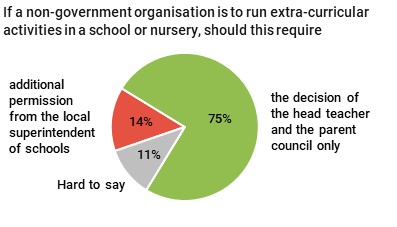40/2022
2022-12-28
NGOs in Schools
If the new education bill (dubbed ‘Lex Czarnek’ by the media, after the surname of the minister of education and science) had become law, any cooperation between schools and non-government organisations would have been made considerably more difficult. In order to come into a school to run activities, NGOs would have had to engage in time-consuming consultations with parents and – controversially – would have still required permission from the local superintendent of schools. This new bill has been vetoed by President Andrzej Duda. The results of the CBOS survey in November show that the president’s veto was in accord with public opinion on the matter. An overwhelming majority of respondents (75%) was of the opinion that for an NGO to run extra-curricular activities in a school the decision of the head teacher and the parent council was sufficient. Only 14% thought it should be confirmed by the superintendent of schools.

|
More on this subject in the CBOS report.
This ‘Current Events and Problems’ survey (391) was conducted using a mixed-mode procedure on a representative sample of named adult residents of Poland, randomly selected from the National Identity Number (PESEL) register. Respondents independently selected one of the following methods: Computer Assisted Personal Interview (CAPI); Computer Assisted Telephone Interview (CATI), respondents receiving researchers’ telephone numbers in an introductory letter from CBOS; Computer Assisted Web Interview (CAWI), where respondents filled in the online questionnaire independently, gaining access by means of a login and password provided in an introductory letter from CBOS. In all three cases the questionnaire had the same structure and comprised the same questions. The survey was carried out between 7–17 November 2022 inclusive on a sample of 1038 people (58.5% using the CAPI method, 24% CATI and 17.5% CAWI). CBOS has been conducting statutory research using the above procedure since May 2020, stating in each case the percentage of personal, telephone and internet interviews.





